Features
Talking With Arlo
But interviewing Guthrie is very easy. The man comes across as an old friend, willing to shoot the breeze no matter where the conversation may roam. He’s as down-to-earth as his songs suggest, and he’s obviously spent some time pondering his own life as an artist. He’s honest, a little modest, and very, very talkative.
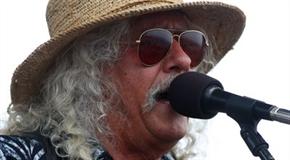
Guthrie’s upcoming tour –
Guthrie also has two live albums coming out. Arlo Guthrie: Tales of ’69 is a recently discovered recording of a show Guthrie performed on Long Island just before Woodstock and features nine tracks including an epic 28-minute talking blues tale. Release date is Aug. 18.
The second album is In Times Like These, which was originally released on CD in 2007, but will see its vinyl debut in September. It’s Guthrie and the University of Kentucky Symphony Orchestra in concert, and the artist says you haven’t heard this album until you hear it on vinyl.
When Pollstar spoke with Guthrie during the last week of June, he had plenty to say about the upcoming tour with his family, the new albums and life in general. But more importantly, he talked about what it’s like to be Arlo Guthrie.
The Guthrie Family Legacy. Is this the first time you’ve had as many family members on one tour as this one promises?
We did this a few years ago and we had so much fun doing it, we thought we’d do it again. This time out everybody’s a little older, especially some of the grandkids. And some of them have become pretty good pickers. I’m looking forward to seeing what will happen this time. We had all of them out last time, but some of them were still babies-in-arms. They didn’t do much except look around.
Especially when you’re young, a year or two can make a pretty big difference. We’ve got a lot to work with that we didn’t have a few years ago. We haven’t actually begun rehearsing for this thing quite yet, so I can’t answer your question directly. I don’t know what’s going to happen yet.
Do you believe in rigid setlists or do you like to go out and play it by ear?
With so many different people … it’s not a rigid setlist so much. It’s a work-in-progress until it gets to a point where it seems to work. The first few weeks out will be a little more trial-and-error. By the time we get into spring of next year, it will have become fairly the same, with maybe a few exceptions, every night.
To stand on stage surrounded by musical family members must be an incredible feeling.
It’s reminiscent of a few who have done it. It brings to mind the Von Trapp Family or the Carter Family, and there’s others, obviously in different genres, and they all tend to be kind of traditional-oriented, folk-oriented. You wouldn’t find a family of classical players as easily. But you do find it in bluegrass and in country music, at times. We see ourselves somewhat in that vein, in that tradition. It’s a pleasure to do it. Not everyone will go on to become a pro but it’s nice to be able to have people who can play together and then relax and take it easy together.
The most wonderful thing is that there are skills you learn when you do this stuff on stage that translate and hang over into everyday life.
When you and your family are not performing in public, are there many impromptu jam sessions at home?
Probably not a whole lot. It’s not even the music I was talking about so much. One of the things about being a player is you have to learn to listen to other people. It’s not something you would do in a normal family quite the same way. But when you start listening to your kids, or they start listening to you, not as a parent or as a kid, or as a grandfather in my case, you start listening to them as a player. And that ability to listen is something that’s learned. It’s not something that comes naturally to everybody.
So that’s what sticks with you. You actually learn to look somebody in the eye and hear what they’re saying, rather than just presume to know. You can’t do that as a musician. And that’s one of the great skills, or great treasures, you get when you play music with anybody. You learn to listen to other people because without it, you can’t play well together.
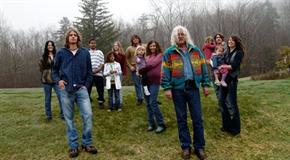
Speaking of listening to other people, who are you listening to these days?
I listen to all kinds of weird stuff. I’ve been doing a lot of driving in the last month, just sitting in the car going down the road doing the gig. Mostly because I’m doing a lot of solo shows this summer. I’ve got the radio going to everything just to see what’s out there, so I don’t know everybody’s name. When I’m listening to the satellite stuff, I actually try to remember who’s who and what they’re doing, but an hour later I’ve already forgotten. I can’t tell you who I’ve been listening to but I can tell you I’ve been listening to a lot of people.
I’m actually awed by how much is expected of new and upcoming musicians these days as compared to when I started. We’re just releasing a record that was recorded 40 years ago and I was thinking to myself, “If I had been like this now, I wouldn’t get anywhere in this business.” You know what I mean?
Are you talking about the state of the music industry in general or the state of the promotional machinery in the ‘60s when you were starting versus what it is now?
No, I’m not talking about the P.R. I’m talking about the state of musicianship, in and of itself.
If you want to hear somebody at a local club in town, a concert or any kind of event, the quality of musicianship is so much better than it was 40 years ago under the same circumstances. It’s really amazing.
Do you feel you and your contemporaries set a pretty high benchmark and that new musicians have to be as good as you just to be noticed?
The truth is, the same was the case when I was a kid. I learned how to play the guitar so much better than my father and his contemporaries because we had all of them to listen to.
I see it as a general evolution of music, it’s not a personal thing. There’s so much more to listen to, especially in an age when so much is documented. You gotta remember, when my dad was a kid, they didn’t have radios and record players and CDs and all that stuff. The only music they heard was by the people they actually went to see. That has changed dramatically because of the technology over the past 80 years. Recorded music is a relatively new phenomena. Especially in this kind of music, as opposed to classical music where it’s written down and you’re still playing the same stuff somebody wrote two hundred years ago. This kind of music didn’t have that.
The world has changed dramatically, and one of the dramatic changes is the way we continue the chain of musical evolution. That’s what’s at the heart of what I’m talking about. The quality of it has been able to absorb the last 80 years of recorded music. When I was a kid, I was able to absorb the last 40 or 50 years.
And it gets better every year. Somebody invents something new, somebody puts something on record and you go, “Oh my God, I gotta learn that!”
And when you do that, it just moves down to younger and younger people being much more sophisticated as players than I would have imagined.
Now, about the tour. That’s a lot of people to take on the road. It’s not like you’re all piling into the family station wagon and going to the next gig.
Actually, it is like that, except the station wagons are bigger. There are a couple of tour buses, and maybe a van or something for all the equipment and gear.
It must be a challenge just to move that many musicians from town to town. How does that work out?
Luckily for us, we’ve been doing this for a long time. The kids grew up in that world, so they know where to be. And the grandkids grew up in that world.
In the early days when I first started, it was me and my wife and we’d take the four kids, open up the guitar cases and put the kids in those cases because they were comfiest, velvet-lined places to sleep. And then I’d go do the show, and then we’d just round them up and go down the road. Not much has changed.
But when you grow up like that, you have an instinctive sense of when everybody is leaving, what to do when you get there, to stay out of the way of the guys who are working the stage equipment – these are just things you learn as you go.
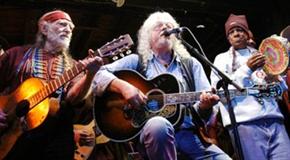
It is our world, and the kids and grandkids have become very familiar with it. The environment is so familiar it doesn’t scare them, it doesn’t intimidate them. They thrive on it.
As a musician and a father, when your daughter, Sarah came home one day and said she wanted to marry Johnny (folksinger Johnny Irion), were you happy she had met another artist or did alarm bells immediately start going off?
I knew it was trouble (laughs). Like I said earlier, I come from a family of musicians. There’s a lot of work involved. You go places, you do things. It’s not routine. You really have to learn.
And you have to have the temperament. Not everyone does. Even in families like ours, there are individuals for whom that life is tough.
That’s what I meant by “trouble.” You have to work at it, and even working on it doesn’t make it all that much easier.
I never even wanted to do this. This wasn’t my idea of great life to begin with, just for me. I wanted to be a forest ranger – that was my idea of a good life. I went to school for it. I knew I would always love playing music, but I thought I would do that when I got home from having a real job. I didn’t think it would end up being the job.
I’ve made the best of it. You get to a point when you realize if it ain’t easy, it’s impossible. I don’t know how many times I have put down the guitar and started all over again from the very beginning with how to put my fingers on the strings.
I started playing when I was five years old, when I got my first guitar, which I still have. My dad told me it was going to take 10 years before I could play it, and I told myself, “He’s nuts. I’ll figure this out in a week.”
Of course, 10 years later, I sat around one day and I told myself. “The old man was right.”
Then 20 years later, I told myself, “The old man’s still right.” I’ve done that a few times already.
Is that what you told your kids and grandkids?
Basically, that’s what I told them – you never want to stop learning. Sometimes you have to go back and start from scratch, throw out everything you’ve learned, and just do it again and do it better, so the foundation gets stronger and stronger. And then you can sit around and play with anybody and do anything. That’s more fun.
I love going to festivals where there are people playing different kinds of music – other artists who I appreciate, Bela Fleck or somebody like that. It’s a different form but that doesn’t mean you can’t enjoy playing with them.
But you have to have a pretty solid foundation. You can’t just be doing your own thing, invent something that’s unique to you and do that over and over again, and expect to be the kind of musician other people enjoy playing with.
I remember Sarah saying to me one day, “Pop, I want to learn to play the guitar. Show me something.”
And I thought, “Wow, okay. It’s always something and that will be the end of it. She’ll just plunk along like a lot of people do.”
She came back a week later and her fingers were bleeding and there was blood on the strings. I said to her, “You know what, sweetie? You’re going to do this. That’s what it takes. Anything less than that is just fooling around.”
There’s nothing wrong with fooling around, but this is how I learned because I loved it. And it became like a lover – something you can’t put down, something that’s with you all of the time. It has been an amazing journey to see the kids begin to understand what a friend music really is.

I remember the day when I was 18-years-old, and I said to myself, “I’m not going to do anything else. I’m purposely going to burn every bridge so the only thing I have left to do is this thing called music.”
I told my mom, who was very disappointed, “I’m not doing anything else. I’m not going to learn anything else.”
And she told me, “Arlo, music is a fickle friend. It can come and go. You better learn to do something else.”
I realized at some point later on that if I had listened to her advice, I would be doing something else right now.
Your mother was in show business as well – a dancer (Marjorie Mazia Guthrie – a Martha Graham protégé).
Yeah. It wasn’t like she was lying, but I think she said that as sort of a test. ‘If the boy buys this line, he’s not meant to do it.’ You know what I mean? No one worked harder at her profession than she did. She dedicated her whole life to it, it became part of her. You couldn’t separate the dancer from my mom, my father’s wife, or other people’s friend. The dancer was a part of her, like being a musician is a part of me at this point.
So you’re constantly challenging yourself?
Well, I love playing with people who have something I can steal from. There’s all kinds of nuances, little things you can learn. It’s not just where to put your hands or how fast you can play.
I was playing with Pete Seeger just a few nights ago. The guy’s 90-years-old, and the way he works that audience is with such subtlety. There’s still a whole lot to learn from a guy like that.
Seeger could play Carnegie Hall with nothing but a banjo, yet he would have the audience in the palms of his hands.
He doesn’t lose them, and I’ve met other people in other art forms that have been able to do the same thing.
[Just like] my mother’s mentor, Martha Graham. I remember meeting her as a child and not being able to take my eyes off of her. Whether it was in a performance, or it was backstage, there was something galvanizing about her presence. And that same thing was true with other people and other things. People who have learned how to be who they are. I’m still learning that from guys like Pete.
You talk about learning from others, so reverse that. Do you hear your influence in other people’s work?
I read about it from time to time. I get these Google Alerts that have my name in it, and it will say something like, “In the vein of Arlo Guthrie … or whatever.”
And I’m wondering, “What could somebody possibly steal that’s in the vein of me?” (laughs).
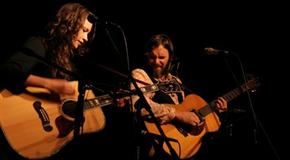
Getting back to the tour, what would you tell someone who isn’t familiar with you or your family’s legacy?
I’d probably tell them to stay away. (laughs) But the truth is, a lot of people are familiar with bits and pieces of the family in one way or another. Any kid that goes to school and is taught to sing “This Land is Your Land” has learned part of what it means to be in this family.
One of the most interesting, intriguing things is that although my dad wrote thousands and thousands of songs, there are a lot of lyrics with no music attached to them because he couldn’t write the music. If he had a tune for them in his mind, it went with him when he passed away.
So over the past 15 years my sister, Nora, has been getting these lyrics out to musicians all over the world, and they’ve been bringing these songs to life with they’re musical interpretations of my dad’s lyrics. Those are the songs we’re going to focus on in the tour coming up. Unlike the first tour where we focused on the songs that made my dad popular to begin with, we want to focus on and thank, in our own way, all of these people who have contributed to the Woody Guthrie legacy by putting a part of themselves in the songs.
We’re going to try to do some from Eliza Gilkyson, Janis Ian, The Klezmatics, obviously Billy Bragg and Wilco songs. There’s a whole host of them. Jonatha Brooke just did a record with a lot of those songs.
I don’t know which ones will end up [in the show]. We’ll take as many as a we can, throw them into the evening and see which ones stick, what order they stick.
You also have, “Times Like These” coming out in September. Can you talk a little about that?
That’s going to be something. What I can tell you is, for anyone who hasn’t heard, I don’t do shows with symphony orchestras all that often. One of the reasons is, it’s much more restraining. You just can’t say, “Let’s play this one.” The guys have to have the music in front of them. So you’re somewhat restrained in terms of spontaneity.
The odds of me getting through an entire night, even if it’s just me alone, without screwing up something, it’s fairly remote.
Yet we had one of those nights… and it happened to be with the University of Kentucky Symphony Orchestra, which meant most of the people in the audience weren’t Arlo fans. They were the moms and pops and families of the kids playing in the orchestra.
So I had new victims, on a night when everything went really well. When no one screwed up in a major way. And it happened to be recorded by one of the great recording engineers of all time, George Massenburg.
We put the thing out on CD. But George calls me and says, “Arlo, you have not heard this until you hear it on vinyl.”
So we decided, you know what? It’s time to go back to the old technology and put this thing out on vinyl so we can really hear the magic that was created that night. It’s a live performance. There’s no screwing around in the studio afterwards. I’m just looking forward to it.
Some of your songs have taken on lives of their own. Lines like “You can get anything you want at Alice’s Restaurant” or “Coming into Los An-gel-eeees” have become catch phrases. How’s that feel?
That’s fine, it’s really fun and it’s great stuff, don’t get me wrong. I recommend for anyone who’s 18 having that much fun to put it in song. To be somebody other people recognize, it’s great stuff.
But it’s not a life, there’s more to life than that. There’s more to music than just entertainment. Those are the things this family has been focused on long before I ever showed up, and that’s the things we continue to focus on.
What’s inspiring or influencing you today?
What’s going on in Iran now is inspiring me. I’m looking at that video of Neda Agha-Soltan, the girl who was killed in Tehran. An amazing moment in time. And the only thing I see in her face is “Why?”
It didn’t have to be – none of this stuff has to be. Who are these guys who feel like this is the world we need to be living in? What kind of world is that?
Those are the kind of things, these are human conditions, these are Shakespearean moments that play out throughout history. And when you add the faces that we see now, it adds to a long history of other faces, whose songs have become a part of our lives.
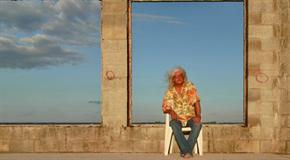
Click here for the Arlo Guthrie Web site.